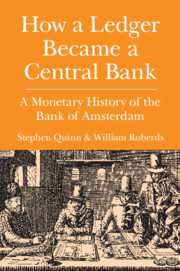
- Publisher:
- Cambridge University Press
- Online publication date:
- November 2023
- Print publication year:
- 2023
- Online ISBN:
- 9781108594752


Before the US Federal Reserve and the Bank of England, the Bank of Amsterdam ('Bank') was a dominant central bank with a global impact on money and credit. How a Ledger Became a Central Bank draws on extensive archival data and rich secondary literature, to offer a new and detailed portrait of this historically significant institution. It describes how the Bank struggled to manage its money before hitting a modern solution: fiat money in combination with a repurchase facility and discretionary open market operations. It describes techniques the Bank used to monitor and stabilize money stock, and how foreign sovereigns could exploit the liquidity of the Bank for state finance. Closing with a discussion of commonalities of the Bank of Amsterdam with later central banks, including the Federal Reserve, this book has generated a great deal of excitement among scholars of central banking and the role of money in the macroeconomy.
‘Stephen Quinn and Will Roberds have written a remarkable book on the world's first true central bank and its first true international currency. Their newly unearthed history sheds much light on the past, but also the future, of the international monetary and financial system.’
Barry Eichengreen - University of California, Berkeley
‘Using a superb combination of expert financial economics and meticulous historical research, Quinn and Roberds explain how the world’s first central bank worked. Their analysis breaks new ground by showing how modern central banking principles already guided eighteenth-century finance. The book is of equally great interest to central banking theorists and economic historians.’
Joost Jonker - University of Amsterdam
‘Based on an impressive amount of archival work and a deep understanding of modern finance, this book opens up a world of monetary operations previously unknown to even the most accomplished scholars of Dutch economic history.’
Oscar Gelderblom - University of Antwerp
‘Unlike many researchers who ignored or misrepresented the evolution of central banking before 1800, Stephen Quinn and Will Roberds have contributed groundbreaking studies in this field for at least twenty years. Their work has also transformed my own understanding of the origins of central bank money, payments, and money market operations. For many years to come, How a Ledger Became a Central Bank will be the reference work not only on the financial and monetary history of the Bank of Amsterdam, but also for any other in-depth study of early central banking.’
Ulrich Bindseil - European Central Bank
‘Who should own and operate a ledger and how different ledgers should be connected are hot topics today. In this remarkable book, Quinn and Roberds teach us how most of the problems that modern banks and central banks were designed, or were evolved, to solve are as old as the hills. Their book is full of examples of how public and private interests fostered trial-and-error processes that adapted, improved, and invented technologies and contracts. The detective work underlying the authors’ stories is fascinating. As I read parts of this book, I find myself gathering insights about modern arrangements ranging from US repo markets to paying interest on reserves to cryptocurrency platforms to interoperability issues across those platforms.’
Thomas J. Sargent - Hoover Institution, Stanford University
 Loading metrics...
Loading metrics...
* Views captured on Cambridge Core between #date#. This data will be updated every 24 hours.
Usage data cannot currently be displayed.